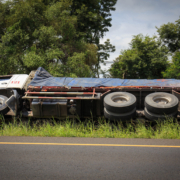ATVs Are Becoming More Popular. And Injuries Are On The Rise.
In New Mexico, riding ATVs is becoming an increasingly popular activity. Our state, after all, offers unusually scenic settings for off-roading, and tourists flock from all over the country to zoom along unbeaten paths.
Yet the dangers of ATV-riding may outweigh the thrills. According to the Consumer Product Safety Commission (CPSC), hundreds of riders die each year in ATV crashes. Perhaps more disturbing still, nearly 100,000 riders suffer serious injuries – and more than 25 percent of them are children.
Where are ATV crashes most likely to take place?
 Concussions and broken bones figure as the most common injuries. But damage to the spinal cord and internal organs happen frequently as well. This shouldn’t be shocking. ATVs weigh in at 600 pounds and can travel at speeds beyond 60 miles per hour. The results of a crash are almost certain to be serious.
Concussions and broken bones figure as the most common injuries. But damage to the spinal cord and internal organs happen frequently as well. This shouldn’t be shocking. ATVs weigh in at 600 pounds and can travel at speeds beyond 60 miles per hour. The results of a crash are almost certain to be serious.
What is surprising is where these accidents take place. One might assume that most off-roading injuries would occur off-road. However, paved surfaces – highways, city streets, and the like – are the most frequent injury sites. This is in no small part because ATVs are prone to collisions with passenger vehicles; as such, the CPSC recommends avoiding paved roads entirely.
What to do after an injury – or before one
Injury victims must seek medical help immediately. Those who fail to get medical care in a timely fashion run the risk of enabling minor injuries to become major ones. It’s important, too, to seek legal counsel. If one’s injuries result from mechanical failure, or the fault of another driver, or poorly maintained roadways, one may be entitled to compensation – but an attorney is key to obtaining it.
Of course, the best approach to injuries is to avoid them in the first place. Giving up ATV-riding isn’t necessary, but it is wise to exercise caution. Safety tips are easy to find, and are fairly intuitive – wear a helmet, supervise children, ride on designated paths. But it’s clear that many fail to heed such advice. The temptation is understandable, yet often leads to calamity.



 According to recent research
According to recent research
 In some cases these incidents are purely accidental. At other times, the manufacturer of a certain good may be at fault for the injuries caused. Ikea, for example, was compelled to recall more than 17 million chests and dressers after their toppling led to the deaths of eight children.
In some cases these incidents are purely accidental. At other times, the manufacturer of a certain good may be at fault for the injuries caused. Ikea, for example, was compelled to recall more than 17 million chests and dressers after their toppling led to the deaths of eight children.
 A
A 

 Indeed, the statistics are staggering. A recently conducted survey revealed that two-thirds of drivers were comfortable talking on their phones while in a parking lot, and about half of all drivers would text, email, scan social media, or watch online videos. Grooming-while-parking also figured as a common (and commonly hazardous) behavior.
Indeed, the statistics are staggering. A recently conducted survey revealed that two-thirds of drivers were comfortable talking on their phones while in a parking lot, and about half of all drivers would text, email, scan social media, or watch online videos. Grooming-while-parking also figured as a common (and commonly hazardous) behavior.




 Vicarious liability and negligent entrustment relate to the liability of one party for an accident that another party causes. These legal theories may come into play if someone loans a vehicle to a friend who is known to be a bad driver. They could also come into play if the employee of a company causes a car accident while on duty.
Vicarious liability and negligent entrustment relate to the liability of one party for an accident that another party causes. These legal theories may come into play if someone loans a vehicle to a friend who is known to be a bad driver. They could also come into play if the employee of a company causes a car accident while on duty.
